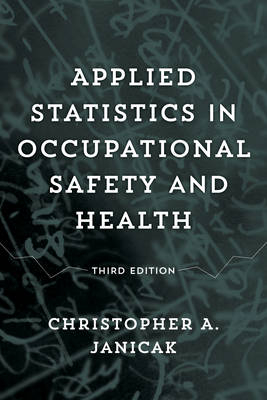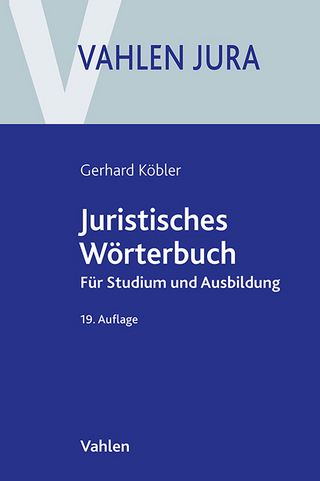
Applied Statistics in Occupational Safety and Health
Bernan Press (Verlag)
978-1-59888-888-1 (ISBN)
Using step-by-step methods and both examples and applications common to safety professionals, including loss control consultants and occupational health nurses, this new edition makes understanding the "math" side of the job easier. Readers will learn how to apply appropriate statistical procedures to commonly encountered situations, how to perform each statistical test, how to executive inferential statistics for parametric and non-parametric procedures, and how to use descriptive statistical concepts to summarize data.
The author ends each chapter with a chapter summary and review exercises. He also includes extensive illustrations, easy-to-read charts and tables, a glossary of statistical terms, a comprehensive index, solutions to sample problems, and five appendices containing statistical tables with their appropriate uses. This third edition provides new examples and numerous updates.
Christopher A. Janicak, Ph.D., CSP, ARM, is a Professor of Safety and Graduate Program Coordinator at Indiana University of Pennsylvania, Department of Safety Sciences. Dr. Janicak has over 20 years of professional experience in safety as a loss control consultant, safety manager, and university professor. He has presented at many national and international conferences, and has published books, book chapters, and journal articles in the field of occupational safety.
Contents
List of Figures and Tables
Preface
About the Author
1
Fundamentals of Statistics
Statistics and Their Use in Safety
Statistics Defined
Common Terms and Notations
Quantitative and Qualitative Data
Statistical Notations
Research Questions and Hypotheses
Types of Studies
Retrospective Studies
Prospective Studies
Experiments
Statistical Samples versus Statistical Populations
Bias
Probability Sample Selection Procedures
Sampling Techniques
Random Samples
Simple Random Samples
Cluster Samples
Stratified Random Samples
Nonprobability Sample Selection Procedures
Chunk Sampling
Volunteer Samples
Variables
Dependent and Independent Variables
Chapter Summary
Chapter Review Exercises
2
Probability and Chance
Probability
Marginal Probabilities
Joint Event Probabilities
Union Probabilities
Conditional Probabilities
Factorials, Permutations, Ordered Combinations, and Combinations
Factorials
Permutations
Combinations
Binomial Probabilities
Poisson Probability
Chapter Summary
Chapter Review Exercises
3
Distributions
Statistical Distributions and Populations
Frequencies
Histograms
Frequency Polygons
Percentages, Cumulative Percentages, and Percentiles
Normal Distribution
Binomial Distribution
t Distribution
Chi-square Distribution
F Distribution
Chapter Summary
Chapter Review Exercises
4
Descriptive Statistics
Data Formats
Categorical Data
Ordinal Data
Interval Data
Ratio Data
Strength of the Data Formats
Measures of Central Tendency
Mean
Median
Mode
Measures of Variability
Range
Variance
Standard Deviation
Interquartile Range
z Scores
z Scores and Percentages of the Population
Confidence Intervals for Means
95% Confidence Intervals
99% Confidence Intervals
Interpreting Confidence Intervals
Chapter Summary
Chapter Review Exercises
5
Statistical Tests
Statistical Hypotheses
Inferential Statistical Testing
Type I and Type II Errors
Alpha Levels
Statistical Power of a Test
Inferential Statistics Test Procedure
Developing a Statistical Hypothesis
Choosing the Appropriate Statistical Test or Procedure
Determining the Statistical Distribution
Determining Significance Levels
Formulating a Decision Rule
Running the Test
Formulating a Conclusion and Making a Decision
Chapter Summary
Chapter Review Exercises
6
Inferential Statistics for Means
z-Test Comparing a Sample Mean to a Known Population Mean
Test Assumptions
Hypothesis Construction
Determine Significance Levels
Using a z Table
Formulate a Decision Rule
z Test Formula
Conclusions
Example z Test Problem
Independent Samples z-Test
Test Assumptions
Independent Samples z-Test Formula
Example Independent Samples z-test Problem
Hypothesis Construction
Conclusions
Example z Test Problem
t –Test for a Single Mean
Test Assumptions
Hypothesis Construction
t Test Hypotheses
Determine Significance Levels
Formulate a Decision Rule
t-Test Formula for a Single Mean
Conclusions
Example t-Test Problem
t-Test for Independent Samples
Paired Samples t-Tests
Test Assumptions
Hypothesis Construction
Determine Significance Levels
Formulate a Decision Rule
Test Formula
Conclusions
Example Paired Samples t-Test Problem
One-way Analysis of Variance
Procedure Assumptions
Hypothesis Construction
Procedure Formulas
Hypothesis Construction
Formulate a Decision Rule
Calculate F Ratio
Conclusions
Post Hoc Procedures
Tukey’s HSD
Calculate Tukey’s HSD
Formulate a Decision Rule
Example ANOVA Problem
Formulate a Decision Rule
Calculate F ratio
Conclusions
Run Post Hoc Tests
Chapter Summary
Chapter Review Exercises
7
Correlation and Regression
Correlation
Pearson Correlation Coefficient
Assumptions
Pearson Correlation Coefficient Formula
Sample Problem
Significance Testing for Correlation Coefficients
Test Hypotheses
Test Formula
Sample Problem
Spearman Rank-Order Correlation Coefficient
Assumptions
Spearman Rank–Order Correlation Coefficient Formula
Sample Problem
Phi Coefficient
Assumptions
Phi Coefficient Formula
Sample Problem
Point Biserial Correlation
Assumptions
Point Biserial Correlation Formula
Sample Problem
Significance Testing for Correlation Coefficients
Linear Regression
Procedure Assumptions
Linear Regression Formulas
Sample Problem
Chapter Summary
Chapter Review Exercises
8
Nonparametric Statistics
Underlying Assumptions Concerning Nonparametric Statistics
Chi-square Test for Goodness of Fit
Degrees of Freedom
Test Assumptions
Hypothesis Construction
Test Formula
Determining the Critical Value
Sample Problem
c2 Test of Independence
Degrees of Freedom
Expected Number of Cases
Test Assumptions
Hypothesis Construction
Test Formula
Sample Problem
Cochran’s Q Test
Test Assumptions
Hypothesis Construction
Cochran’s Q Test Formula
Sample Problem
Cochran's Q Test
Test Assumptions
Hypothesis Construction
Test Formula
Sample Problem
Chapter Summary
Chapter Review Exercises
9
Survey Research
Types of Survey Studies
Collecting and Maintaining Survey Data
Outline for Planning a Survey
Constructing the Instrument
Types of Survey Items
Forms of Questions
Unstructured Questions
Structured Questions
Rating Scales
Likert Scales
Semantic Differential Scales
Formatting Questionnaires for the Mail
Sound Survey Research Procedures
Measurable Objective
Representative Population
Match the Hypothesis to the Statistical Tests
Conduct Background Research
Instrument Validity and Reliability
Cover Letters and Instructions
Sampling for Surveys
Calculating Sample Sizes
Survey Research Limitations
Pilot Testing
Permission to Use Human Subjects
Chapter Summary
Chapter Review Exercises
10
Experimental Design
Experimental Design Uses
Research Hypotheses and Experimental Design
Dependent and Independent Variables
Types of Experimental Designs
One-way ANOVA
Completely Randomized Design
Randomized Block Design
Latin Square Design
Completely Randomized Factorial Design
Chapter Summary
Chapter Review Exercises
11
Presenting Research
Data Presentation for Safety Professionals
Displaying Descriptive Statistics
Displaying Tables
Column Charts
Pie Charts
Presenting Inferential Statistics
z-Tests and t-Tests
Example Results from a Paired t-Test Procedure
One-way Analysis of Variance
Correlation Procedures
Regression Procedures
Nonparametric Procedures
Using Computer Software to Develop Presentations
Sample Data Analysis Using Microsoft Excel
Developing Presentations Using Microsoft Office
Chapter Summary
Chapter Review Exercises
Appendix
Statistical Tables
Cumulative Distribution Function for the Standard Normal Random Variable
Critical Values for the t Distribution
Critical Values for the Chi-square Distribution
Critical Values for the F Distribution
Table of Random Units
Critical Values of the Studentized Range
Glossary
References
Solutions to Selected Problems
Index
| Erscheinungsdatum | 03.12.2016 |
|---|---|
| Verlagsort | Lanham |
| Sprache | englisch |
| Maße | 176 x 253 mm |
| Gewicht | 376 g |
| Themenwelt | Schulbuch / Wörterbuch ► Lexikon / Chroniken |
| Wirtschaft ► Betriebswirtschaft / Management | |
| ISBN-10 | 1-59888-888-9 / 1598888889 |
| ISBN-13 | 978-1-59888-888-1 / 9781598888881 |
| Zustand | Neuware |
| Haben Sie eine Frage zum Produkt? |
aus dem Bereich


